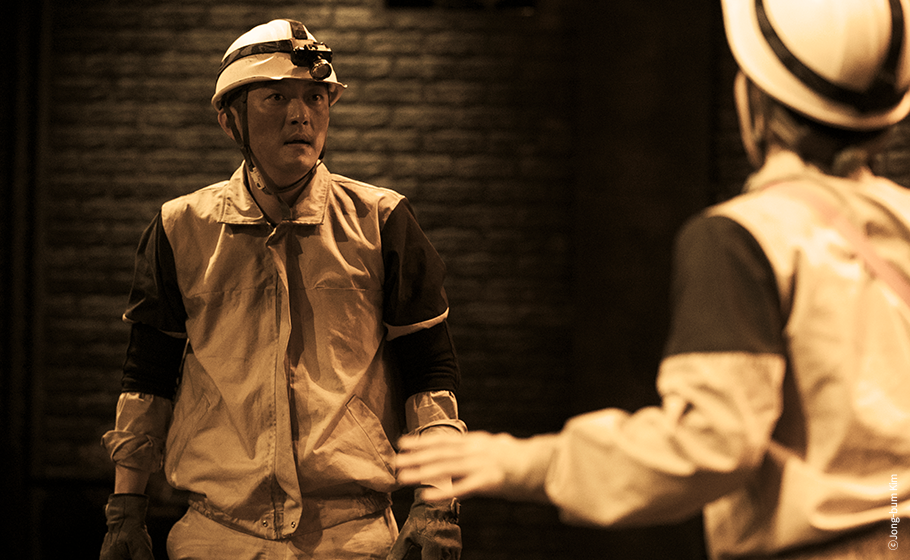Performance Info
PRODUCED BY IMCULTURE
PRODUCER Jung, In Suk
BOOK Kim, Shin Hu
COMPOSER Shin, Eun-kyung
DIRECTOR Kim, Tae Hyung
ADAPTION, LYRICS Jang, Woo Sung
CHOREOGRAPHER Shin, Sun-Ho
SCENIC DESIGNER Oh, Pil-young
LIGHTING DESIGNER Koo, Yun Young
SOUND DESIGNER Kim, Pil Soo
COSTUME DESIGNER Hong, Moon Gi
MUSIC DIRECTOR Beon, Hee Seok
The production of ‘Rho Gi Su’ started from a picture taken by Werner Bischof who served as a war correspondent during the Korean war. Surprisingly, this picture of a group of masked people dancing together was taken at the Geoje Prison Camp run by the US Army in 1952 when scars of war still remained. In that era, the US encouraged prisoners to engage in American cultural activities including singing, playing musical instruments and dancing in their free time. This was to promote the superiority of liberalism. At that time, the conflict between communist and anti-communist prisoners was so intense that prison camps were comparable to battlefields. Those doing folk dance in the Geoje Prison Camp, which was another battlefield, stimulated the creators’ imagination, thus resulting in the musical ‘Rho Gi Su’.
In a prison camp with such a fierce ideological conflict, a young communist prisoner called Rho Gi Su happens to be attracted by a US officer’s tap dance. His older brother Rho Gi Jin is an extreme communist so he hates anything made in USA. Rho Gi Su secretly prepares a performance, hiding himself from his brother and other communist prisoners. In this process, he becomes more and more attracted by the dance. While the US officer tries to use the prisoners’ performance team for promotional purposes, the leader of communist prisoners seeks an opportunity of terrorism. Finding himself in between, Gi Jin tries to protect his brother. In this way, the chracters’ conflict reaches its peak.
Through its solemn narration penetrating scars of the past and through its character Rho Gi Su who falls into tap dance even with his life threatened, the musical tells a story of ideological confrontation, individual liberty as well as dreams and despair found within. The musical also deals with a variety of implications without becoming excessively serious, thanks to its two contrasting elements: prison camp and tap dance. Its meaningful message, cheerful tap dance and touching brotherhood contribute to making the musical more elaborate than any other small-scale musical. During the premiere of the musical, a jib was used at the end of Act 1 where Rho Gi Su is attracted by dance. Such a technical feature aroused the interest of many. However, it was difficult to make such a fantasy effect in a small space so during the musical’s second presentation, the scene was replaced with a flying scene.
REVIEW
As Gi Su is attracted by tap dance, the world on stage is transformed into a place where nothing is just a noise. Sounds of smoothing cloth, polishing shoes and even shaking cans... The transformation of these sounds into rhythms for tap dance is remarkable.
- Kim I-seul, reporter of News Culture
“If you lose your dreams, you will lose yourself. Live each and every day with dreams.” This is what the female character Min Bok Sim tells Rho Gi Su in her song, encouraging him to keep dreaming. Her song moved me to tears. Rho Gi Su’s older brother sings a song as he dies instead of Gi Su to save him who is about to be exectued for performing a dance made in USA. His song also made me shed tears.
- Kwon Young-me, reporter of News1
Gi Su’s enthusiastic dance, which transcends ideologies and nationalities, conveys a message of dreams, love and hope amid the harsh reality of confrontation in war time.
- Ahn Se-young, reporter of The Musical
About the Production Company
IMCULTURE was founded in March 2014 by specialists who had been dedicated to performance production for a decade. As its first performance, the company presented the creative musical ‘Rho Gi Su’ which seeks both artistic value and popularity. In addition to producing creative musicals, the company has carried out experimental projects distorting the existing plays’ space and time. A case in point is the omnibus-style play ‘Capone Trilogy’ which combines three different theatrical styles. As for its musicals as well, the company has continued to dismantle and experiment with theatrical styles. An example of this is the impromptu musical ‘Every Show’s a First Today!‘. The company’s representative musicals are ‘Rho Gi Su’ (2015), ‘Every Show’s a First Today!’ (2017) and ‘Van Gogh and the Sunflower Boy’ (2019). Its representative plays are ‘The Capone Trilogy’ (2015), ‘The Bunker Trilogy’ (2016), ‘Dear My Teacher Elena’ (2017) and ‘The Helmet’ (2017).
Production Details
- Director
Kim, Tae Hyung
Reference
- E-maileh.shim@imculture.co.kr
- Tour Size ( 10 Performers,Required staff )








.jpg)
.jpg)
.jpg)
, 김종구(로기진 역)(0).jpg)
.jpg)
.jpg)

 PREV
PREV
.jpg)
(0).jpg)
(0).jpg)
.jpg)
.jpg)
(1).jpg)
.jpg)
(4).jpg)











